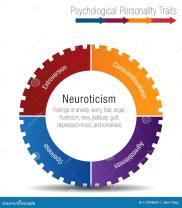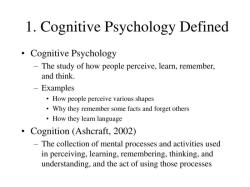What is the definition of case study in psychology?
In psychology, a case study is a detailed, in-depth examination of an individual or a small group of individuals. It is a research method that involves the intensive analysis of a single case or a few cases over an extended period to gain a comprehensive understanding of a specific psychological phenomenon, condition, or behavior. Case studies are commonly used in clinical psychology, counseling psychology, and related fields to explore and illustrate complex psychological issues.
Here are key characteristics and components of a case study in psychology:
Focus on a Single Case or Small Group: Case studies typically center on one individual or a small group of individuals who share certain characteristics or experiences. This focus allows researchers to delve deeply into the unique aspects of the case.
Longitudinal Observation: Case studies often involve long-term observation and data collection, which can span months or even years. Researchers gather extensive data over time to gain insights into the development and progression of a psychological condition or behavior.
Multiple Data Sources: Researchers gather data from various sources, which may include interviews, questionnaires, psychological assessments, clinical observations, medical records, and personal diaries. Combining multiple data sources helps create a comprehensive picture of the case.
In-Depth Analysis: Case studies emphasize detailed, qualitative analysis of the collected data. Researchers aim to uncover patterns, themes, and underlying psychological factors that may be contributing to the case's unique characteristics.
Rich Descriptions: Case studies provide rich, context-specific descriptions of the individual(s) being studied. These descriptions include their background, personal history, experiences, and behaviors.
Contextual Understanding: Researchers consider the broader social, cultural, and environmental factors that may influence the case. Understanding the context helps explain how the individual's experiences and behaviors relate to their environment.
Theory Development: Case studies can contribute to the development or refinement of psychological theories. They provide insights and evidence that may lead to a deeper understanding of psychological phenomena.
Unique and Unusual Cases: Case studies are often chosen when the case is unique, unusual, or represents an extreme or atypical example. These cases can shed light on rare conditions or behaviors.
Ethical Considerations: Researchers conducting case studies must adhere to ethical guidelines, particularly in areas related to informed consent, confidentiality, and the well-being of the participants.
Limitations: Case studies have limitations, including a potential lack of generalizability to larger populations due to their focus on individual cases. They are also subject to researcher bias and may not provide causal explanations for observed behaviors.
In psychology, case studies are used to explore a wide range of topics, including psychological disorders, cognitive processes, developmental milestones, and the impact of interventions. While they offer valuable insights into complex psychological phenomena, case studies are typically just one part of a broader research approach, and their findings are often used in conjunction with data from other research methods to build a more comprehensive understanding of human behavior and mental processes.
Defining the Case Study in Psychology: Concepts and Applications
A case study in psychology is an in-depth study of a single individual, group, or phenomenon. Case studies can be used to explore a wide range of topics, including mental disorders, developmental processes, and social interactions.
Case studies are typically conducted using a variety of methods, such as interviews, observations, and psychological tests. The data collected from these methods is then analyzed to develop a comprehensive understanding of the individual, group, or phenomenon being studied.
Case studies can be used for a variety of purposes, including:
- To develop new theories and hypotheses. Case studies can provide insights into the complex nature of human behavior and mental processes. This information can then be used to develop new theories and hypotheses about how and why people think, feel, and behave the way they do.
- To improve the diagnosis and treatment of mental disorders. Case studies can provide valuable information about the symptoms, causes, and course of mental disorders. This information can then be used to develop more effective diagnostic and treatment methods.
- To inform social policy and programs. Case studies can be used to understand the challenges and needs of different populations. This information can then be used to develop more effective social policies and programs.
Case Studies in Psychological Research: Definition and Significance
Case studies have played an important role in the development of psychology. Some of the most famous and influential case studies in psychology include:
- Phineas Gage: Gage was a railroad worker who suffered a traumatic brain injury after a tamping iron was driven through his head. His case study helped to shed light on the role of the frontal lobe in personality and behavior.
- Anna O.: Anna O. was a patient of Sigmund Freud who was treated for hysteria. Her case study is considered to be one of the first examples of psychoanalysis.
- Little Albert: Little Albert was a young boy who was conditioned to fear a white rat. His case study helped to demonstrate the power of classical conditioning.
Case studies can be a valuable tool for psychological research. They can provide in-depth insights into the complex nature of human behavior and mental processes. However, it is important to note that case studies are not generalizable to the population as a whole. This means that the findings of a case study cannot be applied to other people without further research.
The Role of Case Studies in Advancing Psychological Knowledge
Case studies have played a significant role in advancing psychological knowledge. They have helped to:
- Identify new phenomena. Case studies can help to identify new phenomena that may not be immediately apparent in large-scale studies. For example, the case study of Phineas Gage helped to identify the role of the frontal lobe in personality and behavior.
- Develop new theories and hypotheses. Case studies can provide insights into the complex nature of human behavior and mental processes. This information can then be used to develop new theories and hypotheses about how and why people think, feel, and behave the way they do. For example, the case study of Anna O. helped to inform Freud's theory of psychoanalysis.
- Refine existing theories and hypotheses. Case studies can be used to test and refine existing theories and hypotheses. For example, the case study of Little Albert helped to validate the theory of classical conditioning.
- Generate new research questions. Case studies can generate new research questions that can be explored in larger-scale studies. For example, the case study of Phineas Gage led to research on the impact of brain injuries on personality and behavior.
Case studies are an important tool for psychological research. They can provide in-depth insights into the complex nature of human behavior and mental processes. Case studies have played a significant role in advancing psychological knowledge, and they continue to be used by researchers today.












